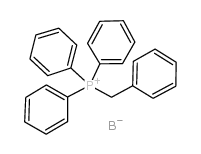benzyl(triphenyl)phosphanium,boranuide
Modify Date: 2024-01-09 19:58:53

benzyl(triphenyl)phosphanium,boranuide structure
|
Common Name | benzyl(triphenyl)phosphanium,boranuide | ||
|---|---|---|---|---|
| CAS Number | 18117-29-8 | Molecular Weight | 367.25100 | |
| Density | N/A | Boiling Point | N/A | |
| Molecular Formula | C25H25BP | Melting Point | 157-163ºC | |
| MSDS | N/A | Flash Point | N/A | |
| Name | benzyl(triphenyl)phosphanium,boranuide |
|---|---|
| Synonym | More Synonyms |
| Melting Point | 157-163ºC |
|---|---|
| Molecular Formula | C25H25BP |
| Molecular Weight | 367.25100 |
| Exact Mass | 367.17900 |
| PSA | 13.59000 |
| LogP | 3.99680 |
Synonym: Section 2 - COMPOSITION, INFORMATION ON INGREDIENTS
Risk Phrases: 15 34 Section 3 - HAZARDS IDENTIFICATION EMERGENCY OVERVIEW
Contact with water liberates extremely flammable gases. Causes burns.Moisture sensitive. Potential Health Effects Eye: Causes eye burns. Skin: Causes skin burns. Ingestion: Causes gastrointestinal tract burns. Inhalation: Causes chemical burns to the respiratory tract. Chronic: Not available. Section 4 - FIRST AID MEASURES Eyes: Immediately flush eyes with plenty of water for at least 15 minutes, occasionally lifting the upper and lower eyelids. Get medical aid immediately. Skin: Get medical aid immediately. Immediately flush skin with plenty of water for at least 15 minutes while removing contaminated clothing and shoes. Ingestion: Do not induce vomiting. If victim is conscious and alert, give 2-4 cupfuls of milk or water. Get medical aid immediately. Inhalation: Remove from exposure and move to fresh air immediately. If not breathing, give artificial respiration. If breathing is difficult, give oxygen. Get medical aid. Notes to Physician: Section 5 - FIRE FIGHTING MEASURES General Information: As in any fire, wear a self-contained breathing apparatus in pressure-demand, MSHA/NIOSH (approved or equivalent), and full protective gear. Water Reactive. Material will react with water and may release a flammable and/or toxic gas. May react with acids or moisture to form explosive hydrogen gas. Extinguishing Media: Use agent most appropriate to extinguish fire. DO NOT USE WATER! Section 6 - ACCIDENTAL RELEASE MEASURES General Information: Use proper personal protective equipment as indicated in Section 8. Spills/Leaks: Vacuum or sweep up material and place into a suitable disposal container. Section 7 - HANDLING and STORAGE Handling: Do not breathe dust, vapor, mist, or gas. Do not get in eyes, on skin, or on clothing. Do not allow contact with water. Use only in a chemical fume hood. Storage: Store in a cool, dry place. Store in a tightly closed container. Keep away from strong acids. Keep away from water. Water free area. Section 8 - EXPOSURE CONTROLS, PERSONAL PROTECTION Engineering Controls: Facilities storing or utilizing this material should be equipped with an eyewash facility and a safety shower. Use adequate ventilation to keep airborne concentrations low. Exposure Limits CAS# 18117-29-8: Personal Protective Equipment Eyes: Not available. Skin: Wear appropriate protective gloves to prevent skin exposure. Clothing: Wear appropriate protective clothing to prevent skin exposure. Respirators: Follow the OSHA respirator regulations found in 29 CFR 1910.134 or European Standard EN 149. Always use a NIOSH or European Standard EN 149 approved respirator when necessary. Section 9 - PHYSICAL AND CHEMICAL PROPERTIES Physical State: Powder Color: white Odor: Not available. pH: Not available. Vapor Pressure: Not available. Viscosity: Not available. Boiling Point: Not available. Freezing/Melting Point: 160 - 163 deg C Autoignition Temperature: Not available. Flash Point: Not available. Explosion Limits, lower: Not available. Explosion Limits, upper: Not available. Decomposition Temperature: Solubility in water: Insoluble. Specific Gravity/Density: Molecular Formula: C25H22P.BH4 Molecular Weight: 368.27 Section 10 - STABILITY AND REACTIVITY Chemical Stability: Stable under normal temperatures and pressures. Conditions to Avoid: Incompatible materials, exposure to moist air or water. Incompatibilities with Other Materials: Water, acids. Hazardous Decomposition Products: Carbon monoxide, carbon dioxide, oxides of boron, phosphorous fumes. Hazardous Polymerization: Has not been reported Section 11 - TOXICOLOGICAL INFORMATION RTECS#: CAS# 18117-29-8 unlisted. LD50/LC50: Not available. Carcinogenicity: Benzyltriphenylphosphonium borohydride - Not listed by ACGIH, IARC, or NTP. Section 12 - ECOLOGICAL INFORMATION Section 13 - DISPOSAL CONSIDERATIONS Dispose of in a manner consistent with federal, state, and local regulations. Section 14 - TRANSPORT INFORMATION IATA Shipping Name: WATER-REACTIVE SOLID, CORROSIVE, N.O.S.* Hazard Class: 4.3 (8) UN Number: 3131 Packing Group: II IMO Shipping Name: WATER-REACTIVE SOLID, CORROSIVE, N.O.S. Hazard Class: 4.3 (8) UN Number: 3131 Packing Group: II RID/ADR Shipping Name: WATER-REACTIVE SOLID, CORROSIVE, N.O.S. Hazard Class: 4.3 UN Number: 3131 Packing group: II Section 15 - REGULATORY INFORMATION European/International Regulations European Labeling in Accordance with EC Directives Hazard Symbols: C Risk Phrases: R 15 Contact with water liberates extremely flammable gases. R 34 Causes burns. Safety Phrases: S 36/37/39 Wear suitable protective clothing, gloves and eye/face protection. WGK (Water Danger/Protection) CAS# 18117-29-8: No information available. Canada None of the chemicals in this product are listed on the DSL/NDSL list. CAS# 18117-29-8 is not listed on Canada's Ingredient Disclosure List. US FEDERAL TSCA CAS# 18117-29-8 is not listed on the TSCA inventory. It is for research and development use only. SECTION 16 - ADDITIONAL INFORMATION N/A |
| Hazard Codes | C-F,C,F,Xn |
|---|---|
| Risk Phrases | R34 |
| Safety Phrases | S7/8 |
| RIDADR | UN 3131 4.3/PG 2 |
| MFCD00800636 |
| BENZYLTRIPHENYLPHOSPHONIUM BOROHYDRIDE |